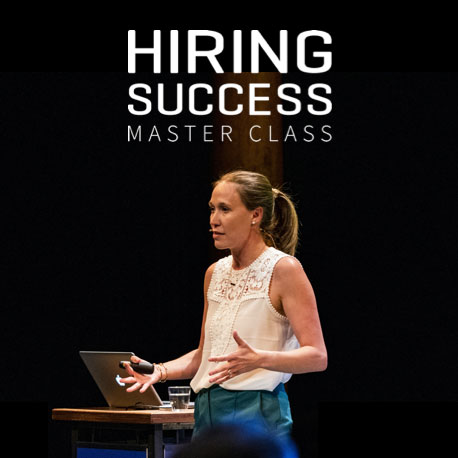This article is part of our focus on sharing how TA leaders can build a more inclusive recruiting process. To become an active participant, check out the Diversity Hiring page!
Companies innovate by hiring people with different strengths. Also called “cognitive diversity” and “diversity of thought,” neurodiversity imagines a workforce that uses varied and unique ways of ideating, problem-solving, and strategizing. Common examples of neurodiversity include ADHD, autism, dyslexia, and many more. But, these conditions shouldn’t be viewed as strict disorders and disabilities.
Rather, you should view neurodiverse candidates and employees as advantageous, pushing the boundaries of your company’s work. These differences afford a competitive advantage since they mix candidate pools and, in doing so, increase the likelihood of reaching creative, competitive talent.
Unfortunately, something has stopped companies from hiring people with rare skills: non-inclusive recruiting practices. Because some behaviors of the neurodiverse contradict notions of a “good employee,” they are screened out before they can show their competitive value. Such companies end up with a culture of sameness, producing fewer novel ideas and solutions.
I want to share case studies of neurodiversity success and advocate for neurodiversity in TA. Learn why you should be more inclusive of neurodiverse talent by hearing how companies like SAP and Microsoft reformed their HR processes. Then, consider whether you are ready to tap neurodiverse talent and if you can mitigate your reservations. Let’s get started.
What neurodiversity looks like at large companies
We know some HR practices block neurodiverse talent, but what does neurodiversity at a leading organization look like? And, how can we learn from their example? Consider these short studies of companies actively gaining neurodiverse advantage through recruiting practices.
IBM
In 2017 ,IBM launched a pilot program in Michigan called IGNITE ASD that matches high-functioning individuals with autism spectrum disorder (ASD) to application testing and quality services positions.
The company reports that neurodiversity has improved the quality of application testing for its clients, as well as the lives of those in the program. Prior to participating in IGNITE ASD, many of them experienced great difficulty with the job search process.
IGNITE ASD was also launched in Australia in partnership with the Specalisterne Foundation. By this year, the company plans to create 300 new IBM jobs for people with ASD.
Auto Trader UK
A few years ago, Auto Trader UK joined forces with the National Autistic Society for consultation on autism awareness training. However, they went above and beyond the initial scope of their partnership and have since been working with the National Autistic Society to make their recruitment process more accessible to neurodiverse talent, strengthen internal policies and training for staff, and deepen the support they provide Auto Trader employees with autism.

As a result of Auto Trader’s commitment to neurodiversity, the National Autistic Society instituted a new award—the Autism Friendly Employer Award—and awarded it to the company. The accolade honors companies that create inclusive working environments for individuals with autism.
SAP
In 2019, SAP sponsored a hack-a-thon to open the annual Autism at Work Summit. One hundred fifty employees from Dell collaborated to improve recruitment, retention, and integration for a neurodiverse workplace.

In their two-day incubation, they created ideas around renovating interview processes and screening candidates. The changes they propose improved organizational ability to match important skills to each available job. An application was coded to achieve this, and it’s just one example of how SAP works to improve lives, gain an edge, and lead in digital innovation.
They have over 100 employees in their program and cite many benefits to hiring neurodiverse talent, like people with autism. Variation of thought offers focus, persistence, pattern recognition, attention to detail, transparency, honesty, and many more healthy workplace traits.
Microsoft
Microsoft is one of the most famous examples of companies with neurodiversity programs. They find they can expand neurodiverse talent in areas of great fit like software testing, analytics, and cybersecurity. Microsoft’s inclusive hiring has resulted in hiring for more roles with tough-to-fill skill sets.
They use inclusive interviewing to provide accessibility, screen candidates in, and help offset underemployment rates for people with autism and other differences. Ultimately, their goal is to make their entire talent process more friendly to neurodiversity and “designed for all.”
Notes on neurodiversity at inclusive companies
As IBM, SAP, Auto Trader UK, and Microsoft show, attracting neurodiversity and opening up your hiring process means you actively seek to benefit from many talents, perspectives, and skills. In pursuit of these advantages, large companies develop specific initiatives to focus on neurodiversity. And, they demonstrate the benefits of higher employee morale, a positive culture, and greater aptitudes in niche roles.
Why you might doubt the importance of neurodiversity
You might neglect neurodiversity if you hold common misconceptions about the movement. For example, you might think the competitive advantage of hiring neurodiverse talent is negligible. But, trustworthy statistics show that one in seven are neurodiverse in the UK alone.
Other reservations include whether you can really create a more resilient organization by hiring people who require accommodations and, in some cases, bring new management concerns. The truth is that all people bring differences and unique difficulties to the workplace, and the benefits of neurodiversity outweigh the required energy and resources.

Finally, common hindrances are whether your organization can provide a safe environment where neurodiverse talent seeks support as needed. Without feeling like they can disclose needs, productivity and performance issues can result. However, cultivating a safe environment is a matter of importance for all employees. And, you can easily improve your culture through simple practices:
- Train on and model the importance of treating all people fairly
- Identify and implement workplace adjustments to disclosure.
- Tailor management and training support to the employee.
- Find ways to help each employee uniquely flourish.
- Spot potential cultural issues before they’re realized.
Leading companies recognize the many advantages of a neurodiverse workforce and show little reservation about its importance to innovation and society. That’s because it improves the health and well-being of entire organizations to be inclusive and accessible.
How to revamp hiring processes for neurodiverse advantage
Making hiring processes and procedures more friendly to difference demands analysis. You’ll have to look closely at your interviewing, training, support systems, and general practices to identify your unique challenges for hiring neurodiverse talent. Implement changes that promote a nontraditional approach:

- Experiment with unconventional interview formats and standardize assessments to reduce bias.
- Offer diversity training for managers and colleagues to prepare a culture of inclusion.
- Implement systems of support for neurodiverse employees to express needs and receive relief.
- Share your successes and struggles with industry peers to promote an image of neurodiversity.
As you instill a diverse and open culture to cultivate inclusive hiring and support, you’ll face challenges to be solved only by a revolution in thinking.
What challenges newly neurodiverse companies face
Attracting, hiring, training, and supporting neurodiverse individuals requires understanding. For example, those with Asperger’s, autism, or ADHD may have vastly different experiences of their condition. You’ll need to make sure your practices are flexible and able to accommodate a variety of unique needs.
Whether you provide special equipment or medical benefits, accommodations will need to be made and easily accessed. However, more than accommodation and support, what employers mention as the most difficult challenge is culture and a shift in conceptions about neurodiversity. Realize that people who can bring competitive advantage to your company deserve specific practices of inclusion and you’ll have already overcome this major obstacle.
Resources for TA leaders
Many online resources can help you cultivate a supportive, neurodiverse workplace:
- Explore neurodiversity’s origins, and check out Disabled World.
- See the real competitive benefits of neurodiversity in this Harvard Review.
- Choose Neurodiversity Hub to get guidance for employers seeking innovations and growth through inclusion.
- See Creative Differences, a handbook on embracing neurodiversity and realizing its creative advantages.
Final thoughts
Infinite variation exists in cognitive function, leading to incredible, innovative differences in thinking and working. To benefit, your organization can succeed in neurodiverse hiring by thinking holistically, raising awareness, and creating supportive environments.
Already over 90 percent of people surveyed in a recent study believe that neurodiversity brings workplace benefits, but most managers lack experience with mentoring such diversity. They also struggle to raise awareness and balance neurodiversity as a priority.
Knowing this, our task as employers must be to resist processes that draw from the same, narrow pool of applicants. By democratizing our practices, we can all improve workplace cultures while positively impacting people’s lives and reducing systematic unemployment.
This article is part of our focus on sharing how TA leaders can build a more inclusive recruiting process. To become an active participant, check out the Diversity Hiring page!

 Enroll in the Master Class & earn 6 SHRM credits
Enroll in the Master Class & earn 6 SHRM credits